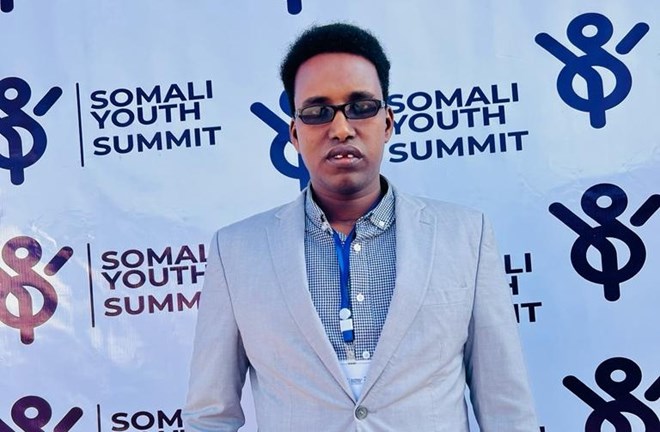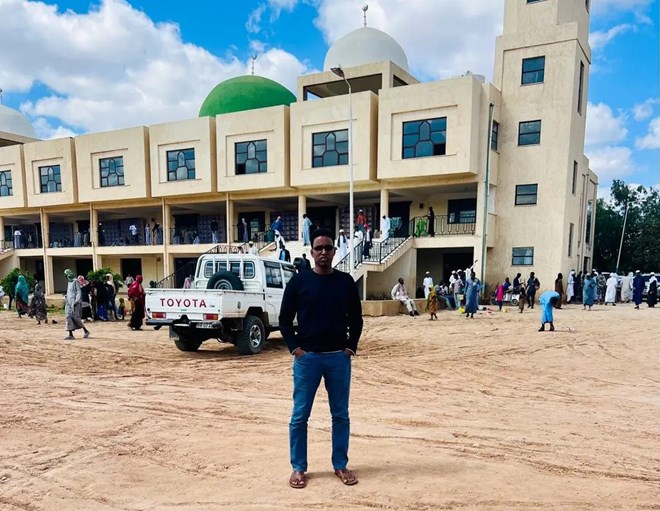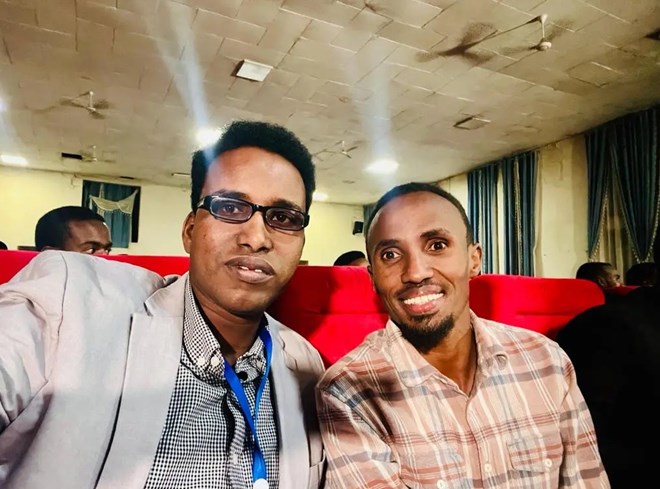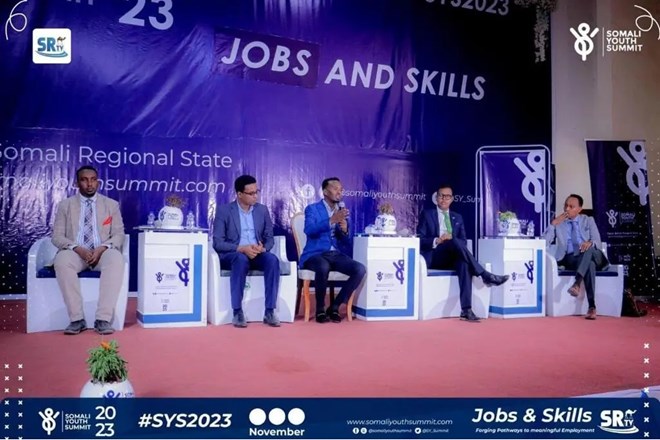Saturday December 2, 2023
By Mahad Wasuge

My friend Mohamed Omer invited me to attend the Somali Youth Summit, which took place in Jigjiga between 25 and 27 November this year. I had never been to Jigjiga before, and I was interested and excited to visit the town and engage with its people. There is no direct flight from Mogadishu to Jigjiga. The two options I had were a transit to Addis Ababa or a flight to Hargeisa and then make road trip to Jigjiga. I wanted to maximize my travel experience and opted for the latter option.
The Trip
I traveled to Hargeisa with a young entrepreneur who was also invited to the Somali Youth Summit. The last time I had landed in Hargeisa was in late 2019. I knew the problems I might encounter with the Egal International Airport immigration. However, since I was only going to be in transit and was not planning to stay in Hargeisa, I didn’t take enough precautions and did not make connections that could have been useful. An officer at the airport checked my passport, as he was doing with everyone else. However, when he checked my computer bag he saw and removed my Somali Public Agenda business card. He put my passport on his office desk and asked me to wait for him outside.
I did not think my business card would be an issue, but it turned out to be problematic. I tried to explain to the officer and two others the SPA work, but I was accused of coming to Hargeisa for a mission against Somaliland. He informed me that I would be deported back to Mogadishu (probably after several days of detention). After almost an hour of discussion, I was finally allowed to enter. By then, the airport was almost empty. Two immigration officers were waiting for me before they closed their offices. It was Thursday, and I was told that almost everyone (particularly those in the government) sits for chewing khat on Thursday after midday.
The vehicle that would take the two of us to Jigjiga was at the airport. We prayed and had lunch in Hargeisa. At around 2:30 pm, we started our road trip to Jigjiga. We stopped over at Gebiley where we bought a takeaway coffee. The tarmac road was under construction. I was told the construction is part of the Berbera Corridor project and would connect Berbera port to Ethiopia through Wajaale.
We had a problem in Wajaale where we stayed for several hours. The customs at the borders are under federal jurisdiction. It took hours of bureaucracy and sending letters until we were allowed in. By the time we were permitted to move on, it was 8 pm.
The road between Wajaale and Jigjiga is also well-constructed. We went through several checkpoints including Tuulo Qaran, where travelers are checked and screened extensively. As we reached Tuulo Qaran, those who were traveling with me started telling horrible stories about how Somalis were abused and punished in Tuulo Qaran a few years back.
Jigjiga was about to host the Ethiopia ethnic annual gathering the following days. The security of the roads leading to Jigjiga was tight; there were government forces inside Jigjiga screening the pedestrians. We went through multiple checkpoints and soldiers were standing on the streets on a very cold evening. We finally arrived at Jigjiga around 9:00 pm. It was a tiresome trip and I got more than I was expecting from the road travel experience I had planned. Luckily, I had one day to rest before the commencement of the Somali Youth Summit.
I prayed the Friday prayer at the large, three-storey Tabliiqa mosque. After the prayer, a Sheikh talked about the Muslim identity of the Somalis in Ethiopia and that they would host ethnic groups with different religious beliefs. He appealed to the community to welcome these people with decency and good manners so that they would convert to Islam.

The Somali Youth Summit
The Somali Youth Summit was organized by a youthful team led by my friend Mohamed Omer, the motivational speaker who took me to Borama – his birthplace – in late 2019. It was the second time the youth summit was convened; it was convened for the first time in Jigjiga in 2021. The theme of this year was ‘jobs and skills’.
The Somali Regional State President Mustafe M. Omer opened the Somali Youth Summit. When he entered the hall, the attendants did not stand up and clap. I did not even notice that he had entered the venue. This kind of low-key entrance by a high-level politician is something I rarely see at Mogadishu events attended by top government leaders. On stage, and during a short break after his opening remarks where I joined a group of participants who met him, Mustafe Cagjar talked about the priorities of his administration and also acknowledged the limitations of their efforts. When he spoke about urban development during the break, he explained his priority in investing in road infrastructure, electricity, and water. He contended that it takes years to develop rural villages. He said that he believes that building the basic city infrastructure would be important for development and job creation in main urban cities. I was impressed by his understanding of global politics, and his use of data and statistics to elaborate on some of his points.
The Somali Youth Summit also included evening sessions. Although I often did not get the schedule in advance, I attended two interesting sessions on Saturday evening. The deputy Minister of Finance of the Somali Regional State Muhyadin Abdi Farah presented a lecture about ‘attitude’. His presentation was engaging and interesting. He used poetry, the Holy Quran, Prophetic Tradition, and other quotes in his presentation. He talked about how Somalis do not value decency and quality. He said that when Somali clans agree that someone is decent and intellectual, they would say ‘This is the right person to kill as revenge for someone who was killed a while ago’. He also talked about corruption in the government. He took an example that Somalis used to rob (dhac) livestock when they were in the rural villages. When they came to urban cities and held public offices, they doubled the term and called the corruption ‘dhac dhac’. I could not believe that someone who talks about attitude and is liked by the youth that much is a member of the regional state.

Abdi Nageeye held a session after Muhyadin Abdi Farah. He talked about his journey to become a long-distance runner and how he did not get support from the Somalis, including his close family members. He illustrated that the young ‘successful’ Somalis are self-made and lack institutions and systems that support them. He also talked about a foundation he has established.
I joined a panel on the second day of the Somali Youth Summit with my former colleague Mohamed Madar who is currently based in Borama, Mohamed Haji Ingiriis, and Nuradin Jilani. Mohamed Omer was moderating the 2-hour session and told the audience that he wanted to kick start the Summit with this panel discussion, but due to the absence of some of the panelists, the panel was postponed to the second day. We discussed about skills, human capital development, and jobs. I emphasized the poor-quality education and the limited opportunities for skills training as well as the absence of key government infrastructures as main barriers to professional development and jobs.
The Somali Youth Summit allowed young entrepreneurs to present their work. I was impressed by the creativity and businesses created by young Somalis in Jigjiga and other Somali cities who attended the summit. I listened to several panel discussions where young entrepreneurs were given the space to talk about their businesses.
Jigjiga City
It was my first trip to Jigjiga. My first observation was that the city has a good tarmac road infrastructure and sewage systems. Many roads were built and others were still under construction. Trees were also planted on street pavements. Bajaaj is the main public transport vehicle of Jigjiga. I saw only one public bus during my short stay. Although the road infrastructure is good, bajaj congestion makes urban mobility difficult.
I stayed at the Muntaha Hotel, which is located near the Sayidka roundabout. The Sayid Mohamed Abdulle Hassan monument was under decoration as the city was getting ready to host other ethnic groups. The food is full of pepper. Restaurant waiters are often Ethiopian ladies who do not understand the Somali language. The famous Ethiopian coffee and food is also widely consumed in Jigjiga.

The Somalis in Jigjiga are diverse. I met with a relative there who grew up and lives in Jigjiga. However, there is an apparent identity crisis among the Somalis who hail from this region in Ethiopia. Dr. Ibrahim Adan Xaalxaali (Dr. Doolaal) had a morning session that I listened to. He talked about the history of governance in the Somali Regional State. He was asked why he hadn’t written a book about the history he had talked about. He said he has a contradictory identity. He explained and said that he was a member of the military regime and the Somali National University lecturer and is now a politician in the Somali regional state in Ethiopia. He advised the youthful audience to learn more about politics in Ethiopia instead of being engaged in developments in Somalia.
Despite the positive developments, youth access to entertainment is limited. Young people watch football matches from their phones, and there are a very limited number of TV screens where youth can watch football competitions. Moreover, I was told that the small salary paid by the government to its workers is not sufficient for their monthly expenses. Working for the government is therefore not attractive to the educated youth. However, I was told that Ministers at the Somali Regional State are accommodated in government-owned buildings.
On my return, I flew from Jigjiga Airport. It has a modest terminal and the road leading to the airport is intact. I left Jigjiga with the feeling that the people in this region have a bright future ahead. The youth were also hopeful of what the future has in store for them. Gatherings like the Somali Youth Summit are the kind of events that people in Jigjiga should host regularly. Those of us who have never visited the city before might leave the town with hope and a positive impression of the Somalis in the Somali Regional State. I hope this will be the first of many visits to Jigjiga.